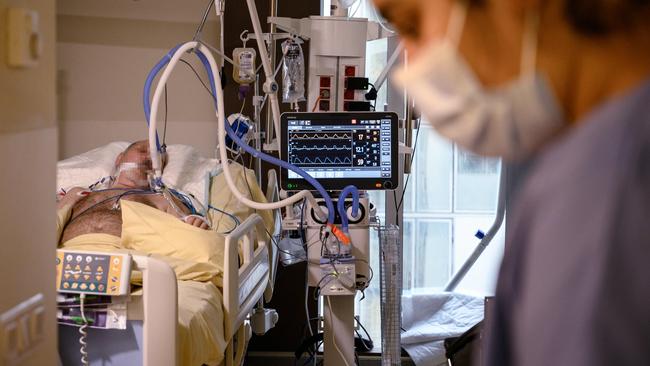Covid-19 leaves legacy of post-traumatic stress
A third of COVID-19 hospital patients who required ventilation suffer from extreme post-traumatic stress disorder.

A third of COVID-19 hospital patients who required ventilation suffer from extreme post-traumatic stress disorder and some who recovered at home report the same, research shows.
One in 10 people who experienced breathing problems but did not need medical help for the virus now have severe PTSD, according to the study. Symptoms include intrusive thoughts or imagery, waves of strong feelings, being easily startled, trying to “erase” memories and avoiding talking about what happened.
The research, published in the journal BJPsych Open from the Royal College of Psychiatrists, was based on 13,049 people in Britain who had suspected or confirmed coronavirus.
Of these, 3466 (26.5 per cent) reported breathing problems but had not required medical input, 176 (1.3 per cent) had had breathing problems and had assistance at home, 147 (1.1 per cent) were admitted to hospital but did not need a ventilator, and 60 (0.4 per cent) were put on a hospital ventilator.
The study found that 35 per cent of those put on a ventilator experienced extensive PTSD symptoms, alongside 18 per cent of patients who were admitted to hospital without needing a ventilator.
Extensive symptoms of post-traumatic stress disorder were also found among patients given medical help at home (16 per cent) and patients who required no help at home but experienced breathing problems (11 per cent).
Overall, 41 per cent of all COVID-19 patients experienced at least one PTSD symptom to an extremely high degree, with the most common being intrusive images or “flashbacks”, such as being on an intensive care ward surrounded by doctors in PPE and dying patients.
Symptoms can start immediately or after a delay but usually within six months of a traumatic event where a person is in danger, feels their life is threatened or sees other people dying or being injured. Without timely treatment PTSD symptoms can continue for years and prevent people from moving on with their lives.
Adam Hampshire, from Imperial College London, who worked on the study, said: “We can see that the pandemic is likely to be having an acute and lasting impact, including for a significant proportion of patients who remained at home with respiratory problems and received no medical help.
“This evidence could be important for informing future therapy and reducing the long-term health burden of this disease.”
Adrian James, president of the Royal College of Psychiatrists, said: “This virus isn’t just a threat to our physical health, it also poses significant risks to mental health during and following the illness.”
The Times



To join the conversation, please log in. Don't have an account? Register
Join the conversation, you are commenting as Logout